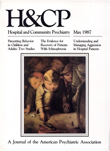Chronicity in Schizophrenia: Fact, Partial Fact, or Artifact?
Abstract
Clinical experience has appeared to support the view that persons with repeated episodes of schizophrenia can expect to have a chronic course with residual symptoms and lasting deficits in such areas as work, social relations, and self-care. However, the authors' review of recent long-term follow-up studies and of the clinical experiences of early researchers strongly challenges this pervasive expectation. This report suggests that there is considerable heterogeneity in the long-term outcome of schizophrenia, with marginal or deteriorated states more the exception than the rule. Among the contributors to the misperception of chronicity are biased sampling, both past and present, as well as a multitude of environmental and psychosocial factors that affect patient outcome.
Access content
To read the fulltext, please use one of the options below to sign in or purchase access.- Personal login
- Institutional Login
- Sign in via OpenAthens
- Register for access
-
Please login/register if you wish to pair your device and check access availability.
Not a subscriber?
PsychiatryOnline subscription options offer access to the DSM-5 library, books, journals, CME, and patient resources. This all-in-one virtual library provides psychiatrists and mental health professionals with key resources for diagnosis, treatment, research, and professional development.
Need more help? PsychiatryOnline Customer Service may be reached by emailing [email protected] or by calling 800-368-5777 (in the U.S.) or 703-907-7322 (outside the U.S.).



